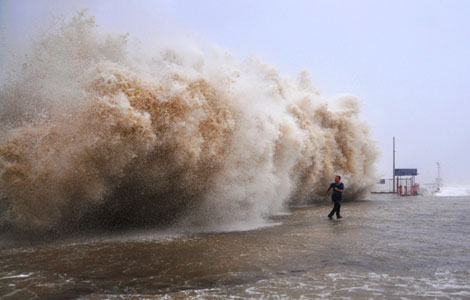Looting of seabed relics rings alarm bells
Updated: 2013-09-23 16:21
(Xinhua)
|
||||||||
HAIKOU - A surge in the looting of underwater relics in the South China Sea has put the region's cultural heritage in danger, prompting local authorities to intensify conservation efforts.
Driven by lucrative profits, treasure hunters flock to the waters administered by China's newest city of Sansha in Hainan Province to retrieve relics of sunken ships and ancient treasures aboard them.
Home to about 1,000 people, Sansha was established last year to administer about 2 million square km of islands, coastal areas and territorial seas in the South China Sea.
Archaeological surveys conducted in the region show lots of damage has been done to relics lying on the ocean floor, as researchers found that more artifacts have been illegally excavated or ruined.
During a survey this year, two ancient rock anchors, which were left unearthed in 2010 due to poor excavating equipment, were found missing at a relic site. Four iron cannons that were discovered by researchers in 2010 at another site have also gone.
"Looting has caused destruction of the relics. We find new damage each year," said Li Jilong, a researcher from the provincial cultural heritage bureau. "The way treasure hunters loot the relics is destructive."
Li said illegal excavators are no longer content with stealing small artifacts like porcelain but want bigger pieces such as rock anchors and ship plates.
Historical records showed that many ancient Chinese ships struck hidden reefs during trips to southeast Asian countries, and sank in shallow waters near the islands in Sansha, which made it easier to hunt for treasure.
To gain a grasp of the region's cultural heritage, the country has carried out large-scale archaeological investigations since it reclaimed the Xisha Islands, also known as the Paracel Islands, from Vietnam in 1974.
Official data showed that a total of 128 relic sites so far have been discovered and documented in the waters administered by Sansha. There are more than 100 sites in the waters surrounding the Xisha Islands alone and of these over half have been damaged.
Local authorities are increasingly aware of the importance of conserving the relics, which have provided a wealth of material for research on how ancestors in the region lived.
Sansha is now drafting a conservation plan for its two major relic sites. Both were put on the list of national heritage sites in 2006 but were not properly protected.
The Sansha government plans to conduct emergency excavations at sites of high research values or sites highly likely to be targeted by treasure hunters.
Plans are already underway to build a South China Sea museum and expand the Hainan provincial museum to collect relics from the emergency excavations.
Authorities have increased the crackdown on illegal treasure hunters. The province cultural heritage bureau purchased a new patrol boat this year.
The lack of experiences and resources and the sheer size of South China Sea, however, has proved a challenge too daunting for the law enforcement authorities.
"The battle against treasure hunters has become an awkward competition, in which the party that is better equipped and more patient wins. At this point, we are losing," said Wang Yiping, head of the Hainan provincial cultural heritage bureau.
Wang said his bureau has to commission maritime authorities to conduct patrols because it does not have its own fleet. For various reasons, routine patrols have been impossible, hence no threat to the treasure hunters.
Even the bureau's new boat could not help much, as it is small with a mere range of 300 kilometers.
The State Administration of Cultural Heritage had considered building a network of unmanned surveillance platforms on the sea, but the plan was shelved due to technical problems.
"Authorities at all levels must coordinate their efforts, increase the awareness of the public and get tougher on lawbreakers," Wang said. "What's urgent now is to set up a joint maritime patrol mechanism, and clamp down on the trade of looted artifacts."
- Specialist investigates relics taken overseas
- Boat topples cultural relic
- Relics reveal civilization along Silk Road
- Looted cultural relics displayed back in China
- China faces challenges in preserving cultural relics
- Looted relics to return home this week
- 4 arrested for stealing relics from the Great Wall
Most Viewed
Editor's Picks

|

|

|

|

|

|
Today's Top News
Israeli soldier killed in West Bank shooting
Death toll in Nairobi mall attack rises to 68
Verdict for Bo Xilai: Life in prison
Amber alert across Asia, but not red
China foreign minister at UN
Smithfield shareholder vote Tuesday
China signs 12 deals with Venezuela
Trending news across China
US Weekly

|

|













